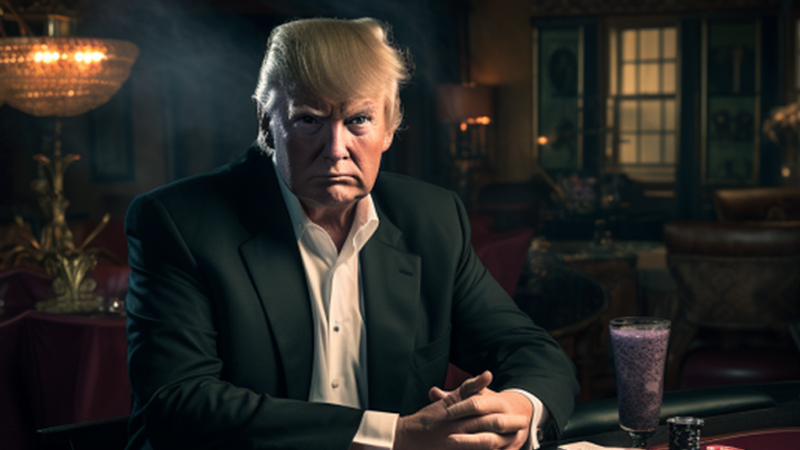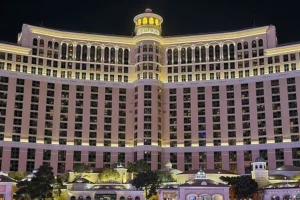Why Does the U.S. Gambling Business Still Support Donald Trump? – Opinion

Over last weekend, Donald Trump met with billionaire casino owners Frank and Lorenzo Fertitta at his Trump International Hotel Las Vegas.
The former President and 2024 presidential candidate has, over the years, received $5.23 million in campaign donations from the Fertittas. The casino mogul brothers are owners of Red Rock Resorts and its subsidiary, Station Casinos.
Red Rock Resorts is one of the fastest-growing operators of Nevada casinos. That includes the recently opened Durango Casino Resort, which targets Sin City’s often-underserved local gambling market over the tourist-packed Las Vegas strip.
Having owned several New Jersey casinos in Atlantic City from 1984 until 2009, Trump’s connections to the gambling business are deep, so him seeing support from its key figures is nothing new.
The 45th President has counted some of the most famous and important figures in U.S. gambling as his personal friends.
As well as the Fertittas, that includes disgraced Wynn Resorts founder Steve Wynn, Treasure Island Las Vegas owner Phil Ruffin, and the late Sheldon Adelson, founder of Las Vegas Sands.
Trump is also close with former New Jersey governor Chris Christie, who was responsible for pursuing the court case that overturned the Professional and Amateur Sports Protection Act (PASPA), which opened the floodgates for legal U.S. sports betting.
Given all that, you might expect that Trump has a glorious track record of supporting the gambling business. Consider he has received millions in campaign contributions over the years, and it apparently made him a fortune in Atlantic City.
“President Trump, his administration, and Congress will unquestionably implement policies that will directly impact our industry for years to come,” said then-American Gaming Association VP Whitaker Askew, speaking to the Associated Press after Trump’s 2016 Presidential victory.
But as with most things about Trump, the truth is somewhat unclear.
Atlantic City Disaster
“Atlantic City is a disaster. And I did great in Atlantic City, I knew when to get out, my timing was great, and I got a lot of credit for it,” Trump said in a Republican presidential debate in 2015.
Is that a fair assessment?
Well, Trump may well have personally made a lot of money from his decades in Atlantic City. Exactly how much is debatable. Just like his net worth in general, in fact.
However, it is impossible to dispute that, at various times, casinos, his debtors, his employees, hardworking contractors, and the state of New Jersey all lost out during his decades operating in the city. Bigly, as Trump might say himself.
However, it is impossible to dispute that, at various times, casinos, his debtors, his employees, hardworking contractors, and the state of New Jersey all lost out during his decades operating in the city. Bigly, as Trump might say himself.
Which makes it both telling and ironic that he used the word credit in his description, when loans were at the heart of the rise and fall of his New Jersey casino empire.
In 1990, the $1 billion Trump Taj Mahal Casino Resort was touted as one of the hottest gambling venues in America, if not the world. 75,000 people attended to watch Michael Jackson perform on the opening night.
But less than a year later, the saturation of the market and the opening of new Tribal casinos in Connecticut and New York undercut the new mega-resort’s business.
One executive told him the casino would have to make a million dollars a day to keep up with operations and debt repayments, and was promptly fired. Then, in late 1991, the Taj Mahal declared bankruptcy.
Trump was forced to sell a mega-yacht and his airline company to keep the operation going. He even took to a Congressional hearing to lambast the Mashantucket Pequot tribe for having the temerity to open a casino.
“They don’t look like Indians to me,” he said. “They don’t look like Indians to Indians,” the then-44-year-old Trump said at a 1993 hearing.
However, his efforts failed, and Tribal casinos continued to expand in neighboring states to New Jersey, taking customers from Trump’s venues.
By 1995, Trump Plaza and Trump Casino Atlantic City also went bust. A restructuring effort, rebranding into Trump Hotels and Casino Resorts (THCR), also went belly-up after spending big on the Trump World’s Fair casino in 1996, which closed three years later.
In 2004, THCR went bankrupt once again, and Trump sold most of his shares. At the peak of its financial hole, it owed $1.6 billion in debts.
Trump then sold the rest of his shares and resigned from the board in 2009, leaving New Jersey with a $30 million unpaid tax bill.
That would prove to be the last time he was directly involved in a casino business.
By 2014, Trump was filing legal proceedings to have his name removed from his former New Jersey hotels and casinos that were still standing, as the sad state of their upkeep was damaging his brand.
All the while, Trump “did great” in Atlantic City by asset-stripping his failed casinos. More than 100 contractors on the Taj Mahal project have since alleged they were never paid.
His friend, Chris Christie, was even alleged to have intervened in a 1993 tax filing over a failed Indiana casino project in Gary, and in reducing his 2006 tax bill to New Jersey from $42 million to $9 million.
Those last allegations were never proven. But given all that history, it remains a question why the gambling business supports a man who did so much to tarnish the reputation of a U.S. gambling hub.
Presidential Moves
Despite all of that, the Trump image clearly kept him popular, with his public appeal never waning much even after his disastrous Atlantic City ventures.
Trump’s acquaintances and personal friendships made during that time would have also helped, as well as his eventual political successes.
During his time in the Oval Office, Trump was apparently influential in working with Florida Governor Ron DeSantis on negotiating a new gaming compact with the Seminole Tribe of Florida. Signed in 2021, after Trump left office, it was only fully implemented in 2023 after long legal delays that went all the way to the Supreme Court.
He also presided over two years of sports betting legalization from 2018 to 2020, which covered seven new state markets.
However, a little digging shows neither of those cases are actually clear shows of support for the wider gambling business from Trump.
In the case of the Seminoles compact, wording was included within the agreement related to possible casinos with 15 miles of existing Hard Rock casinos in Florida. Which happened to cover Trump’s Doral Golf course resort, a venue the Trump Organization had previously expressed interest in turning into a casino.
In the case of the repeal of PASPA and the resulting sports betting legalization, Trump can hardly take credit for that either.
In fact, his office actually opposed the repeal of PASPA in an official capacity. It’s a decision that may or may not have been influenced by Trump’s failed attempt to legalize New Jersey sports betting in the 1990s.
The former President’s courting favor with the casino business people also extended internationally. In May 2016, Trump had an ad-hoc surprise meeting with Vietnamese president Nguyễn Xuân Phúc. Sources suggested the meeting was set up privately by Trump’s lawyer, at the behest of an American investor in Vietnamese casinos, Philip Falcone.
Friends and Foes
Trump’s vocal support of gambling also seemingly doesn’t cover everyone in the business, as he has consistently supported some of the few publicly anti-union U.S. casino owners.
Unions, which many might not imagine from the outside, are huge in the U.S. casino business. Especially in Las Vegas, but also in markets like the three Michigan casinos in Detroit or those in Atlantic City.
Some of Trump’s closest casino business supporters, the Fertittas, Carl Icahn, and Phil Ruffin, have had controversial pasts with the unions. Trump was also sued by the Atlantic City casino unions in the 2000s.
Seeing as strike action bought Michigan casinos to their knees for several months in 2023, and the threat is not over in Nevada going into 2024, casino owners ignore unions at their peril.
Still, many prominent gambling business figures do still support Trump heavily, both personally and financially.
That’s despite his clear track record of offering little to the wider business beyond positive words, personal favors to prominent supporters, and interventions in legislation that benefit his personal interests. None of which is sustainable to a healthy U.S. gambling sector in the long-term.
If he wins in 2024, little looks likely to change in that regard.











